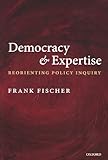Democracy and expertise : reorienting policy inquiry
Publication details: Oxford Oxford University Press 2013Description: 339p ixISBN:- 9780199565245
- 320.600000 FIS
| Item type | Current library | Shelving location | Call number | Status | Date due | Barcode |
|---|---|---|---|---|---|---|
 BOOKs
BOOKs
|
National Law School | MPP Section | 320.6 FIS (Browse shelf(Opens below)) | Available | 34394 |
About this Item: Oxford University Press, United Kingdom, 2013. Hardback. Condition: New. New. Language: English. Brand new Book. This book examines the role of policy expertise in a democratic society. From the perspectives of both political theory and policy studies, the chapters explore the implications of deliberative democratic governance for professional expertise and extends them to specific policy practices. Following the lead of John Dewey, the discussion focuses in particular on the ways professional practices might be reoriented to assist citizens in understanding and discussing thecomplex policy issues of an advanced technological society. In doing so, it also explores how public deliberation can be improved through more cooperative forms of policy inquiry. Adopting a deliberative-analytic approach , policy inquiry is grounded in a postempiricist, constructivist understanding of inquiry and knowledge and the participatory practices that support it. Toward this end, the chapters draw on thriving theoretical and practical work dedicated to revitalizing the citizen's role in both civil society and newer practices of democratic governance, in particular deliberative democracy in political theory, practical work with deliberative experiments, thetheory and practices of democratic governance, and participatory research. Deliberative practices are promoted here as a new component part of policy-related disciplines required for participatory governance. Calling for a specialization of "policy epistemics" to advance such practices, the second half ofthe book takes up issues related to deliberative empowerment, including the relation of technical and social knowledge, the interpretive dimensions of social meaning and multiple realities, the role of narrative knowledge and storylines policy inquiry, social learning, tacit knowledge, the design of discursive spaces, and the place of emotional expression in public deliberation.

There are no comments on this title.